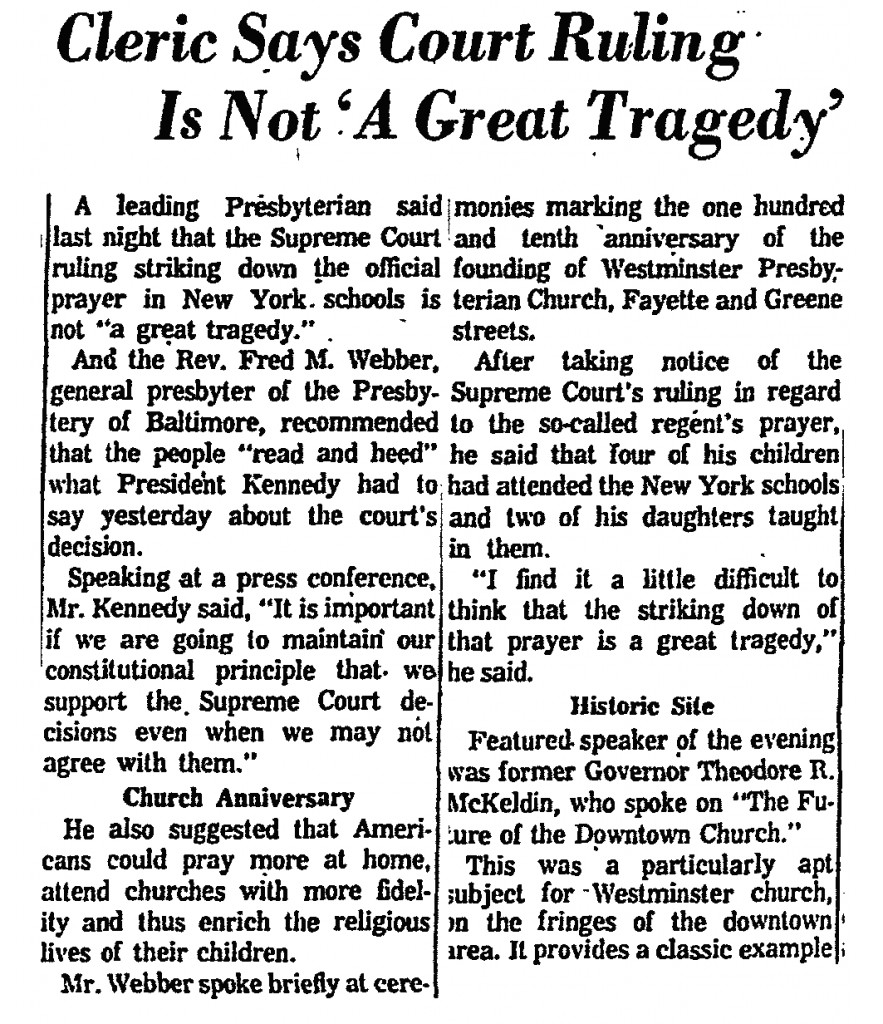It is surprising how frequently the news today echoes the news of the 1960s. As one example, courts in 2014 are hearing cases concerning prayer in public meetings and whether a Bible curriculum written by the conservative Christian and owner of Hobby Lobby can be taught in public schools. On June 25, 1962, the Supreme Court delivered a decision on Engel v Vitale, a case involving a state-written prayer for use in the public schools in New York.
Almighty God, we acknowledge our dependence upon Thee, and we beg Thy blessings upon us, our parents, our teachers and our Country.
“As supervisors of the state’s public education under New York law, the Board of Regents wrote this classroom prayer in 1951. Formal religion has no place in public schools, they said, but ‘teaching our children, as set forth in the Declaration of Independence, that Almighty God is their Creator’ would give the ‘best security’ in dangerous days. They recommended their prayer to local school boards; some accepted it, including the board in New Hyde Park, which voted in 1958 for the prayer to open each school day.” (1)
The parents of ten students in the Hyde Park school system objected and asked a New York court to stop the use of the prayer. The state court upheld the use of what became known as the Regents’ Prayer in the schools. In 1961, the Supreme Court accepted Engel v Vitale for review. And on June 25, 1962, the Supreme Court reversed the state court’s decision, saying that it violated the First Amendment’s ban against the establishment of religion. The court ruled that “any state-sponsored prayer, even if it is denominationally-neutral, represented an unconstitutional effort to promote religion and an infringement of the wall of separation that the Constitution set up between church and state.” (2)
As one can imagine, the decision sparked a great controversy, with a number of prominent church leaders and politicians speaking out against the decision.
President Kennedy was asked about the decision during a press conference on June 27, 1962:
And later that day, Fred M. Webber, General Presbyter of the Presbytery of Baltimore, spoke briefly at a celebration of the the 110th anniversary of the founding of Westminster Presbyterian Church in Baltimore. Fred M. Webber addressed some of his comments to the Supreme Court decision and recommended that people “read and heed” what President Kennedy had to say. He is quoted as saying:
“I find it a little difficult to think that the striking down of that prayer is a great tragedy.”(3)
I’m with you, Uncle Fred.
***
If you would like to read more about Fred M. Webber, click the Fred Myron Webber tag/link at the bottom of this post.
Sources:
1. “The Warren Court, 1953-1969.” The Supreme Court Historical Society. http://www.supremecourthistory.org/history-of-the-court/history-of-the-court-2/the-warren-court-1953-1969. (June 23, 2014).
2. “Religion in Public Schools: Engel v Vitale.” Digital History. http://www.digitalhistory.uh.edu/disp_textbook.cfm?smtID=3&psid=1197. (June 23, 2014).
3. “Cleric Says Court Ruling Is Not ‘A Great Tragedy’.”The Baltimore Sun.” JUne 28, 1962. Pg. 48.



